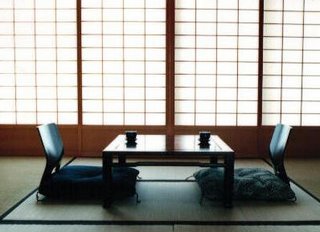 The man who brought peace between many of the yakuza factions was named Yoshio Kodama.
The man who brought peace between many of the yakuza factions was named Yoshio Kodama.Kodama was in jail for the early part of the occupation, placed in the same section as cabinet officers, military, and ultranationalists. He himself was part of the ultranationalist group Kenkoku-kai (Association of the Founding of the Nation). In the late 1930's and early 1940's he worked as an espionage agent for the Japanese government, touring East Asia. He worked on a major operation to obtain strategic materiel needed for the Japanese war effort.
By the end of the war, he had obtained the rank of rear admiral (an impressive feat at the age of thirty-four), and was advisor to the prime minister. He was rounded up with other government officials in 1946 and placed in Sugamo Prison to await trial. The occupation forces saw Kodama as a high security risk, should he ever be released, due to his fanatacism with the ultranationalists.
Kodama had made a deal with the occupation forces G-2 section, and upon his release, was working for the intelligence branch of G-2. He was the principal go-between for G-2 and the yakuza by 1950. (Kaplan, p63-9)
In the early 60's, Kodama wanted the yakuza gangs, who were now fighting one another, to join together into one giant coalition. He deplored the warfare, seeing it as a threat to anticommunist unity. He used many of his connections to secure a truce between the gangs. He made a fast alliance between Kazuo Taoka, oyabun of the Yamaguchi-gumi faction, and Hisayuki Machii, a Korean crimeboss in charge of Tosei-kai.
The alliance broke the Kanto-kai faction for good. Kodama continued to use his influence to mediate the alliance between the Inagawa-kai and its Kanto allies and Yamaguchi-gumi. The truce that Kodama had envisioned was now at hand.
Yoshio Kodama was then referred to as the Japanese underworld's visionary godfatherSource URL: https://3dwallpaperart.blogspot.com/2006/07/kodama-peace-maker.html
Visit 3D Wallpaper Art for daily updated images of art collection




